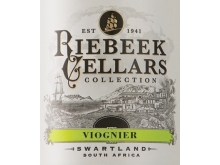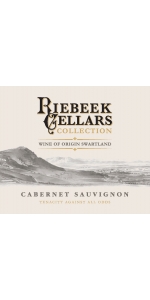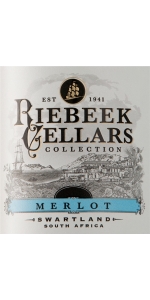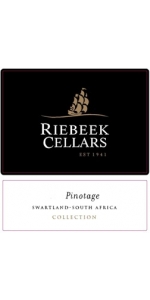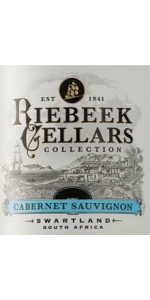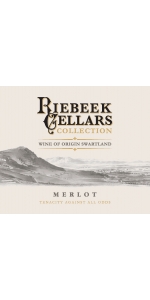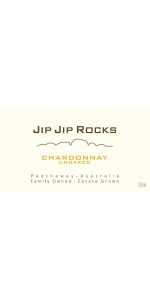Riebeek Viognier 2020
| Country: | South Africa |
| Region: | Riebeek Kasteel |
| Winery: | Riebeek Cellars |
| Grape Type: | Viognier |
| Vintage: | 2020 |
| Bottle Size: | 750 ml |
Riebeek Cabernet Sauvignon is made from 100% Cabernet Sauvignon.
An exciting new world style wine with upfront blackcurrant flavors. The black fruit is well-balanced with subtle French oak for a complex nose and an elegant and lingering follow-through. An exceptional example of a lighter style Cabernet Sauvignon that can be enjoyed young. Excellent with red meat dishes or veal.
Cold soaked overnight. Inoculated with selected yeast. Fermentation temperature was between 24 -26 degrees Celsius. Regular pump-overs were given to enhance colour and flavour extraction. Different batches of wine matured with French oak staves and 2nd and 3rd fill barrels were all blended together to perfection.
Served at room temperature, this Cabernet Sauvignon pairs perfectly with red meat dishes, especially classic recipes like roasted leg of lam, grilled lamb chops and beef kebabs.
Riebeek Cellars Merlot is made from 100% Merlot.
Grapes were cold soaked overnight. Inoculated with selective yeast. Fermentation took place at 24 - 26 degree Celsius. Wine were pressed at
above 2 degree Balling. Malolactic fermentation finished in stainless steel tanks. Oak maturation include French oak chips, French oak staves and 2nd and 3rd fill barrels. All blended together to perfection.
The style is elegant with distinctive red berries and well-integrated wood flavors on the nose. The pallet is velvety and smooth with an aftertaste that lingers with the juicy flavors of abundant berries.
At room temperature or slightly chilled. Enjoy with pasta or light meat dishes.
Riebeek Pinotage is made from 100 percent Pinotage.
The color is an attractive bright, ruby red with a purple rim, typical of a young Pinotage. The flavors of this unique South African cultivar are complex and exciting with ripe plum and fruitcake all beautifully integrated and then finished with subtle oak for a lingering aftertaste.
Lovely with rare beef, barbequed lamb and casseroles. This versatile lighter style of Pinotage is also a lovely combination with spicy chicken.
Riebeek Cabernet Sauvignon is made from 85% Cabernet Sauvignon,15 % Shiraz.
An exciting new world style wine with upfront blackcurrant flavors. The black fruit is well-balanced with subtle French oak for a complex nose and an elegant and lingering follow-through. An exceptional example of a lighter style Cabernet Sauvignon that can be enjoyed young. Excellent with red meat dishes or veal.
Riebeek Cabernet Sauvignon is made from 100% Cabernet Sauvignon.
An exciting new world style wine with upfront blackcurrant flavors. The black fruit is well-balanced with subtle French oak for a complex nose and an elegant and lingering follow-through. An exceptional example of a lighter style Cabernet Sauvignon that can be enjoyed young. Excellent with red meat dishes or veal.
Cold soaked overnight. Inoculated with selected yeast. Fermentation temperature was between 24 -26 degrees Celsius. Regular pump-overs were given to enhance colour and flavour extraction. Different batches of wine matured with French oak staves and 2nd and 3rd fill barrels were all blended together to perfection.
Served at room temperature, this Cabernet Sauvignon pairs perfectly with red meat dishes, especially classic recipes like roasted leg of lam, grilled lamb chops and beef kebabs.
Riebeek Cellars Merlot is made from 100% Merlot.
Grapes were cold soaked overnight. Inoculated with selective yeast. Fermentation took place at 24 - 26 degree Celsius. Wine were pressed at
above 2 degree Balling. Malolactic fermentation finished in stainless steel tanks. Oak maturation include French oak chips, French oak staves and 2nd and 3rd fill barrels. All blended together to perfection.
The style is elegant with distinctive red berries and well-integrated wood flavors on the nose. The pallet is velvety and smooth with an aftertaste that lingers with the juicy flavors of abundant berries.
At room temperature or slightly chilled. Enjoy with pasta or light meat dishes.
This unoaked style of Viognier offers an accessible wine with enough body but without wood flavors.
The color is a brilliant green-gold and the style is dry but fruity. The perfume of a floral bouquet greets the nose and follows through with lovely tropical flavors in a light but lingering palate.
Free run juice was used. After settling and acid adjustment, it was inoculated with selected yeast. Fermentation temperature stayed between 13-14 degree Celsius. Wine was left on lees for few months prior to bottling to enhance the flavor. Alcohol: 13.82% Residual Sugar: 3.4 Total Acidity: 5.3 pH: 3.5
Slightly chilled. Lovely with most entrees - from crisp salads to creamy soups. Beautiful with chicken and fish - whether served grilled or in a creamy sauce.
The Riebeek Cellars Estate
Riebeek Cellars was established in 1941 and is situated in Riebeek Kasteel at the foot of Bothma's Kloof Pass. This medium-sized winery on the western coast of the Cape Province of South Africa sources its grapes from the fertile Riebeek Valley and the slopes of the mountain where the climate is very similar to the Mediterranean. Through the years as vineyard practices developed, cultivars were planted in soil and at slopes best suited to them. These well-tended vineyards enable the production of high quality wines which makes Riebeek Cellars the choice of wine buyers internationally. Well-known both in South Africa and abroad, Riebeek Cellars manages a variety of brands for various countries.
Heritage
Corporal Pieter Cruythoff, a scout of Jan van Riebeeck, founded the Riebeek Valley in 1661. Impressed by the single standing mountain, he called it Kasteelberg (“Castle Mountain”) commemorating the Castle of Good Hope in Cape Town, the fortress of Commander Jan van Riebeeck. The twin towns, Riebeek Kasteel and Riebeek West, established at the foot of Kasteelberg, are therefore also suitably named after Van Riebeeck.
The Riebeek Valley is a mecca of wonderful wines, exceptional food and exquisite art where tourists and locals alike are forever tempted into spending more time than allowed. The serene valley falls in the bigger Swartland region which is called the 'bread basket' of South Africa for its grain production, while it is further internationally acclaimed for its high quality olive products. With various hotels and fine-dining restaurants as well as true country hospitality, the Riebeek Valley has become a very popular tourist destination. The ultimate charm of Riebeek is however in its people and their commitment and passion for wine.
"Located in the Western Cape region of South Africa, this winery was established in 1941, which makes it relatively old compared to all the new wineries that have sprung up in this area. Among the first Pinotages I can recommend, it’s also a good value. Pinotage, which is, of course, ubiquitous in South Africa, was first made in 1941, when the Cinsault grape (primarily grown in southern France and the Rhone Valley) was crossed with Pinot Noir." - Robert Parker's Wine Advocate (Issue 201, June 2012).
Riebeek Cabernet Sauvignon is made from 85% Cabernet Sauvignon,15 % Shiraz.
An exciting new world style wine with upfront blackcurrant flavors. The black fruit is well-balanced with subtle French oak for a complex nose and an elegant and lingering follow-through. An exceptional example of a lighter style Cabernet Sauvignon that can be enjoyed young. Excellent with red meat dishes or veal.
Riebeek Cellars Merlot is made from 100% Merlot.
Grapes were cold soaked overnight. Inoculated with selective yeast. Fermentation took place at 24 - 26 degree Celsius. Wine were pressed at
above 2 degree Balling. Malolactic fermentation finished in stainless steel tanks. Oak maturation include French oak chips, French oak staves and 2nd and 3rd fill barrels. All blended together to perfection.
The style is elegant with distinctive red berries and well-integrated wood flavors on the nose. The pallet is velvety and smooth with an aftertaste that lingers with the juicy flavors of abundant berries.
At room temperature or slightly chilled. Enjoy with pasta or light meat dishes.
Riebeek Pinotage is made from 100 percent Pinotage.
The color is an attractive bright, ruby red with a purple rim, typical of a young Pinotage. The flavors of this unique South African cultivar are complex and exciting with ripe plum and fruitcake all beautifully integrated and then finished with subtle oak for a lingering aftertaste.
Lovely with rare beef, barbequed lamb and casseroles. This versatile lighter style of Pinotage is also a lovely combination with spicy chicken.
Romariz White Port is a blend of wines from the Arinto, Boal, Codega, Esagna CAO, Folgasao, Gouveio, Viosinho, and Rabigato grapes grown in the Douro. This is aged in oak for three years. Aromas of fruit cocktail, round and full, orange-nutty undertone, strong flavored and sweet. Refreshing summertime drink on ice.
FOOD MATCH: Served alone for after-dinner sipping.
Bright golden color, balanced acidity and sweetness. Taste of cinnamon, vanilla, liquorice and clay. Pleasant finish with bitter herbs.
In 1904 Cherubino Valsangiacomo produced the first vermouth bottle, afther 100 years, the fifth generation of the Valsangiacomo familly STILL making it with the ancestral formula devised by Benedetto Valsangiacomo.
White Vermouth, flavored fortified white wine base, together with aromatic mediterranean herbs such as fennel, chamomille and tyme, sweeted with sugar, and grape must caramel.
Ideal as an aperitif, on the rocks with an lemon slice. Also very good with cured and pickled products.
SALE!
Jip Jip Rocks Chardonnay is made from 100 percent unoaked Chardonnay.
Light yellow with a pale straw hue. A classic nose of lemon, fresh stonefruit and melon. The palate is clean and fresh with mineral characters underpinning ripe pineapple and lime flavours. This wine will age beautifully over the next 4-5 years.
Winemaking report: Gentle pressing and free run juices create the base of this wine. Traditionally Jip Jip Rocks Chardonnay is a 2/3 blend fermented and matured in stainless steel and 1/3 fermented in stainless steel, which receives extended lees contact to add texture and complexity to the palate.
Review:
Attractively fruited and fragrant, the wine shows golden peach, baked fig, vanilla and lemon peel aromas on the nose, followed by a succulent palate that’s creamy and lingering. Beautifully styled and highly enjoyable. At its best: now to 2023. AU$23.00. Dec 2019.
-Wine Orbit 92 Points
- back
Mark your calendars for June! Caymus 50th Anniversary Napa Valley Cabernet Sauvignon 2022 is a testament to fifty years of exceptional winemaking by the dedicated, passionate, and family-owned Caymus Vineyards. Since 1972, they have remained a beacon of excellence in Napa Valley, staying true to their roots and producing unparalleled Cabernet Sauvignon. This limited edition wine is a celebration of their rich history, tradition, and relentless pursuit of quality across generations.

